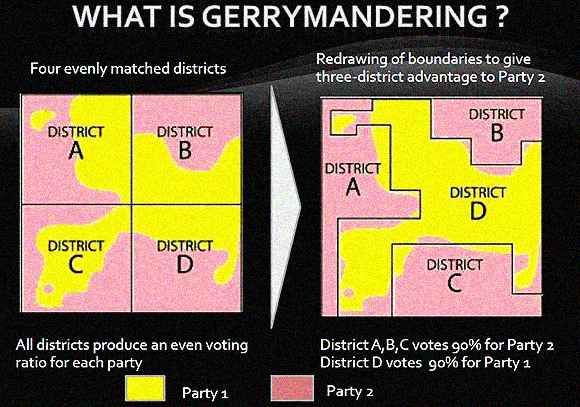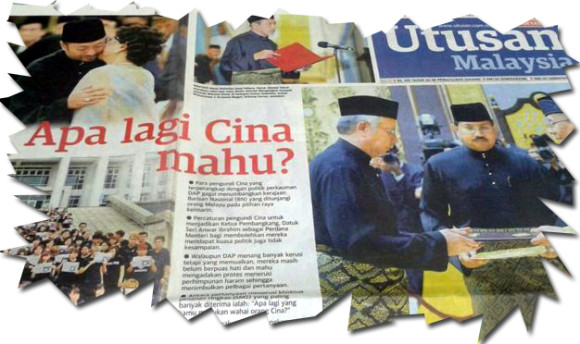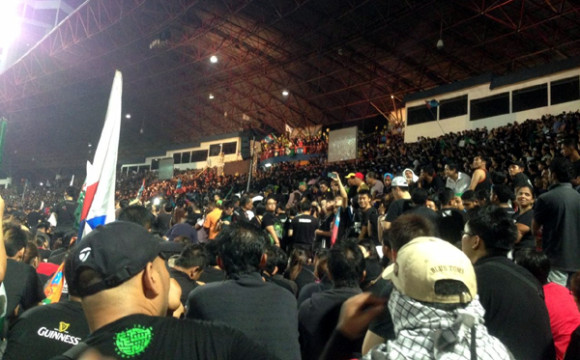Uncommon Sense with Wong Chin Huat: Beyond GE13
By Ding Jo-Ann | 13 May 2013 |
AND so the Barisan Nasional (BN) is still in power. Those hoping for a change in government are still coming to terms with the results of the 13th general election since our independence (GE13). The Nut Graph asks political scientist Wong Chin Huat how the BN won, why it would racialise the poll results, and what needs to happen next.
TNG: So, the BN is still in power. How did that happen, considering that there was such an upsurge in support for the Pakatan Rakyat (PR), as reflected in the increase in popular vote for the PR?
The PR’s vote share has risen from 36% in 2008 to 51% in 2013, but its seat share merely increased from 36% to 40% and the BN continues to rule despite more voters rejecting it than supporting it. This is the outcome of malapportionment where constituencies are of unequal electorate sizes, and of gerrymandering – manipulating constituency boundaries to benefit certain parties.

An overview (Source: Facebook)
This results in an over-representation of the BN. In other words, if a vote were compared to a bank note of RM1, a vote for the BN is overvalued, allowing it to buy RM1.27 worth of seats; while a vote for the PR is so undervalued that it can only buy RM0.78 worth of seats.
This violation of the one-person-one-vote principle is an old issue but it has been overlooked. In 2004, when the BN was so popular with Tun Abdullah Ahmad Badawi’s ascendancy, a vote for the BN was worth about three votes for the DAP, eight votes for PAS and 26 votes for PKR.
Malapportionment and gerrymandering get much less attention because procedural cheating through impersonation by phantom voters, multiple voting and ballot stuffing is much easier to understand. I hope the concern over a minority government’s lack of legitimacy in terms of votes leads to two things: firstly, high public interest in the constituency re-delineation process which the Election Commission says will be done at year end. And secondly, to a change of the electoral system being put on the electoral reform agenda.
Prime Minister Datuk Seri Najib Razak has described his losses as the result of a “Chinese tsunami“. Subsequently, Utusan Malaysia ran a front-page headline “Apa lagi Cina mahu?” which the prime minister defended. Why would Najib and an Umno-owned daily resort to racial polarisation at a time like this? And what impact do you think it will have on Malaysia?
For Utusan Malaysia or Umno politicians to ask questions like “What more do the Chinese want?” is really nothing new. This is the standard operating procedure whenever the BN is rejected by Chinese Malaysian voters. Never mind that Umno was rejected by Malay Malaysians in southern Johor, Selangor, Terengganu and pockets of Pahang and Malacca, or that there was also a moderate Kadazandusun swing.

Subconsciously for Umno, Chinese Malaysian voters are “guests” whose rights depend on Umno’s mercy rather than citizens with constitutional rights. Hence, the Chinese may negotiate with the BN on their demands, but their role in the elections is really as voting machines, at least one third of whom are meant to support the BN.
The rejection of Umno-BN by Chinese Malaysian voters is seen as a rejection of Malay Malaysians. In 1969, that and the MCA’s subsequent withdrawal from the new cabinet were seen as a sign of the Chinese challenging the Malays’ political dominance. This triggered the 13 May tragedy.
Najib’s attempt to ethnicise this election and his defence of Utusan Malaysia’s provocation means he has decided to throw his 1Malaysia brand out the window in a desperate move to seek the return of Malay Malaysian votes. He must have hoped that the Chinese could again be the convenient bogey, as in 1969 when that enabled his father, Tun Abdul Razak, to take power away from Tunku Abdul Rahman for himself.
Unfortunately, for Najib, this is 2013, not 1969. The threat of violence – from the dodgy bombing a few days before polling to the call for another 13 May by some quarters such as pro-Umno blogger Papagomo – has not worked.
On 8 May, reportedly 120,000 Malaysians – including teenagers – flooded the Kelana Jaya stadium to register their protest against election fraud. The mood was jovial and carnival-like. While Najib may think he has won the election, he may also have lost a generation. When youngsters start going to opposition political rallies as if they were going to dance parties, the BN government has been abandoned by the future.
Opposition Leader Datuk Seri Anwar Ibrahim has said his work is not done and held the 8 May rally at the Kelana Jaya Stadium to dispute the election results because of electoral fraud. The evidence shows that it is not a level playing field for the opposition and much electoral reform is still needed. However, would you say there is “electoral fraud”? And is holding another mass rally especially when there are rising racial tensions appropriate?
Fraud has clearly happened. The “reform” of postal votes left a substantial number of police and military voters on the postal ballot. It also added a substantial number of election workers as well as journalists as postal voters. Unlike advance voting, postal voting is completely non-transparent, which opens up the possibility of fraud.

A section of the turnout at Kelana Jaya Stadium. (Pic courtesy of Alexis Wong)
Then, the indelible ink, which the EC was said to have spent some RM10 million to purchase, turned out to be washable, making it impossible to prevent multiple voting or impersonation by police and security voters. Finally, the counting and tallying processes are questionable. Opposition polling and counting agents in certain constituencies were harassed or threatened, and, most importantly, denied the signed Form 14 which officially records the outcome of counting in a polling stream, also known as a saluran.
Without all these flaws, plus the rampant vote-buying through handouts, treating and outright bribery, before and during polling day, the BN could have won even less than 47% of the popular vote.
I think protest rallies are necessary to send a message that the people do not recognise the federal government’s legitimacy. Without such protests to make more people aware of the flaws and to pressure the BN to clean up the electoral system, history will repeat itself come GE14. As shown by the turnout on 8 May, the protest was national and representative of all walks of life. Those who tried to paint it as an ethnic issue must feel that they have been slapped by the peaceful protesters there.
What needs to happen next with regard to electoral reforms? How likely is that to happen?
We will need to reconsider changing the electoral system. If the seats are allocated in proportion to vote share, cheating by ways of impersonation and double voting will be much less attractive to the election criminals. Why? To increase one seat (0.45% of the size of Parliament) may require some 50,000 phantoms, which is clearly cost-inefficient.
More than ever before, Malaysians are now interested in revisiting the electoral system. If you leave electoral reform to the politicians, they will only pursue it when they are weak enough to worry about being a victim of the system, or when they are strong enough to mobilise public support to push for change. In the 1980s and 1990s for example, the opposition was simply too weak that they just dismissed the flaws in the system rather than advocate for change.
For electoral reforms to take place before GE14, we will need more citizens to speak up and force it on the agenda, at least on the PR’s agenda. Otherwise, GE14 would be the same story again. 
WITH its strong showing in the 13th general election since our independence (GE13), should the opposition leader come from the DAP? Will PAS continue with its calls for an Islamic state and hudud? And why didn’t Sabah and Sarawak deliver much-needed votes to the Pakatan Rakyat (PR)? Wong Chin Huat explains.
What does it mean that the DAP is now the strongest party in the opposition coalition? Should the opposition leader in Parliament then be somebody from the DAP?
Although the PR did not get to register itself formally as a coalition, it ran its GE13 campaign in that way. It should, therefore, act as one. The parliamentary opposition leader in the Westminster system is the prime-minister-in-waiting. Since the PR agreed that Datuk Seri Anwar Ibrahim would be prime minister when it takes over, the opposition leader position should also go to Anwar.
There is also no reason to particularly fear the rise of a particular party. While the DAP is the largest party in the PR by parliamentary seats, its 38 seats is less than half of the PR’s 89 seats.
With PAS’s performance in GE13, what does this mean for the hardliners who want to establish an Islamic state and implement hudud?
PAS’s next congress or muktamar must indeed be watched. With the defeat of the party’s mainstreamers/moderates like Mohamad Sabu, Dr Dzulkefly Ahmad, Salahuddin Ayub and Datuk Husam Musa, the puritans/hardliners would likely push for the party to return to its advocacy of an Islamic state rather than a welfare state.
Umno will certainly exploit this to lure PAS’s hardliners in the name of religious unity. In 1974, Najib’s father managed to bring PAS into the BN. But within four years, PAS left with bitterness when it realised that Umno had been undermining its power base in Kelantan. Many PAS old-timers, including spiritual leader Datuk Nik Abdul Aziz Nik Mat, will never allow PAS to rejoin the BN.
Why didn’t Sabah and Sarawak deliver the votes that were needed to help the PR secure Putrajaya?
For those who want change, the election outcome in Sabah and Sarawak was indeed disappointing. Despite the PR’s gains in seats particularly in Sarawak, it picked up only those seats from cities and towns, where the DAP performed tremendously well in the 2011 state elections. Unlike Sabah where at least one bumiputera-dominated seat changed hands, the opposition has failed to make any inroads into inland Sarawak.
Why didn’t Sabah and Sarawak voters vote against the BN despite the fiasco of the Sulu invasion of Lahad Datu, and the Global Witness expose of the land sale scandal involving Tan Sri Abdul Taib Mahmud’s family and cronies? Poverty has made inland voters susceptible to vote-buying. Lack of resources further clipped the opposition’s campaign in these large states, where some constituencies are the size of a West Malaysian state. 
Wong Chin Huat is a political scientist by training and was a journalism lecturer prior to joining the Penang Institute, a Penang government think tank. If readers have questions and issues they would like Wong to respond to, they are welcome to e-mail editor@thenutgraph.com
No comments:
Post a Comment